What Would Martin Luther King Jr. Be Dreaming About if He Were Alive Today?
Reviewing HBO's King in the Wilderness While Writing About Noah Purifoy
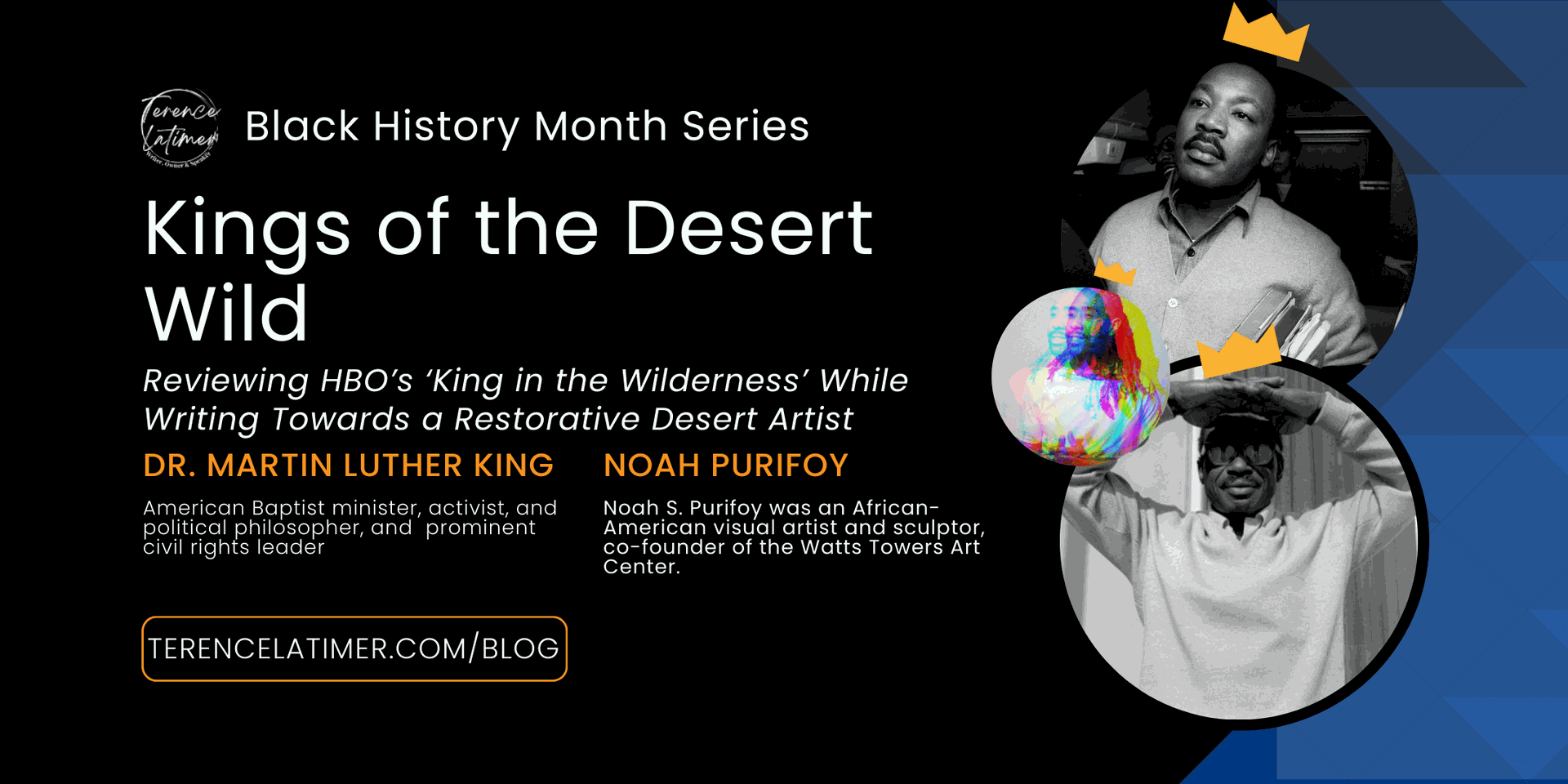
What originally began as a post about Los Angeles based artist Noah Purifoy, has splintered off into a post about Martin Luther King Jr.
While writing about Noah Purifoy, I found it impossible not to dive deeper into Dr. King.
Patiently wading through the legacy of an artist who's impact to my current home is felt in more ways than one, the desire to honor my commitment to publish once a week gets more or less complicated based on varying levels of introspection and inspiration.
Not hitting last weeks deadline means I missed out on the social goodwill and conversation which the "algorithm overlords" might have seen keen to bless with extra views (and still might) to amplify a message to dedicated followers and community members.
I didn't hit my goal, but perhaps that's okay, because I'm here and excited about hitting the publish button for your opportunity to review and reflect.
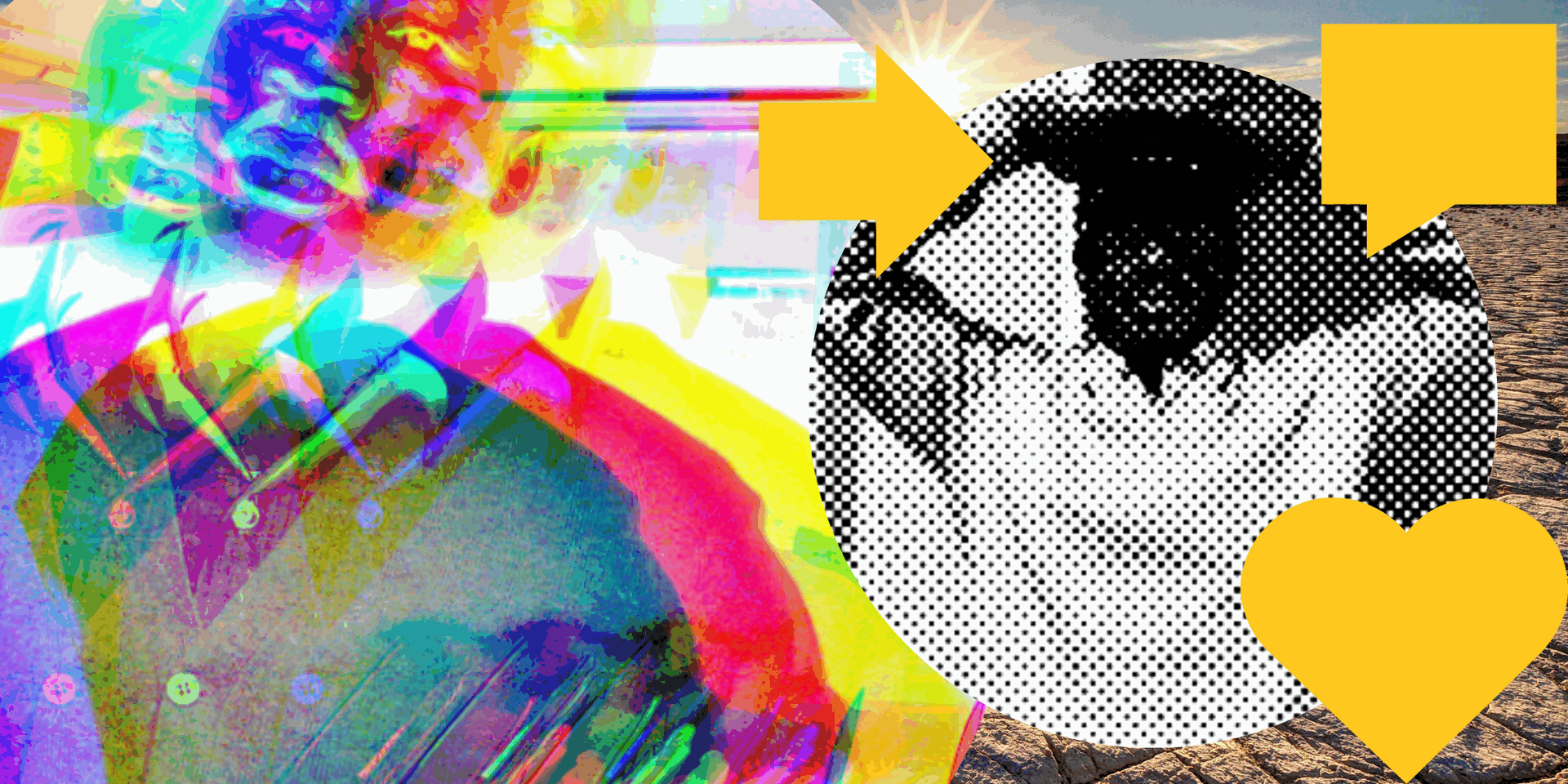
The Trouble With Hero's: Observing Dr. King's Legacy Once A Year
As I mentioned earlier in the post, I have been grappling with an essay about Noah Purifoy, an artist I've been lucky enough to have been inspired by.
At the time, I had begun to prepare myself and the Black Cactus Co-Working space for a grant writing workshop, inspired by no other than Dr. King.
Economics and money you see, were key to Dr. King's message, and are parts of his legacy which I believe happens to be ignored.
Learning about Dr. King, and my interpretation of his ultimate message and meaning, meant honoring a personal desire to explore the complexities of a man whom I believe has been frustratingly simplified within a lame present understanding of his iconic, "I Have a Dream Speech."
Through social listening, I'm mindful of different groups and their capacity to command the ever so important currency of attention.
Calendar reminders, notifications, and strategic and thereby sophisticated opportunities to reinforce core messaging and influence perception and narratives.
Holidays, and celebrating the legacies of many of our favorite historical characters, offers inspirational intonation of values systems core to the identities and ideals of a nation.
The problem though, in my humble opinion, is when these legacy figures have had their messages co-opted and transformed into broad musings and easily accessible, thereby absurd, caricatures.
In light of several military conflicts, Ray Dalio's call for a change to capitalism, and recent Bitcoin ETF approval, the questions formed regarding this generations challenges, and the challenges I've observed in the rural communities I live in, the question begins to beg itself if Dr. Kings dream of the future was reverted itself to a dream deferred.
Is Kanye West The Black KKKLansman We Didn't Know We Needed?
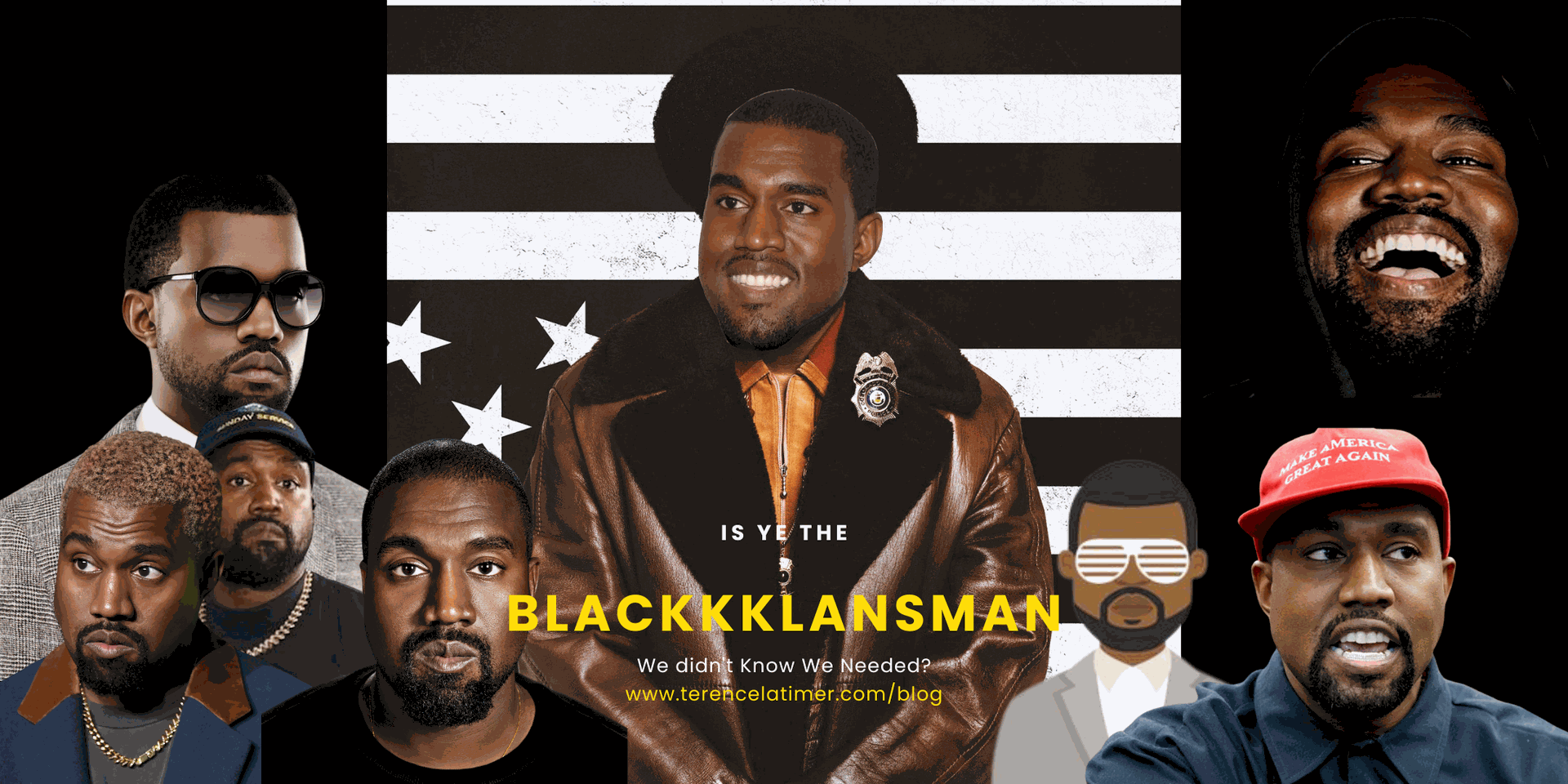
The problem with hero's I've found, is the idealism we attach ourselves to. Considering all of us are complex, simplifying the legacy of a man, ultimately transfers foundational messages, to mere myth.
The challenge with separating myth from truth, fact from faction, begs the question: "Who's responsible for keeping the facts?"
In Black America, factions of Post-Luther Kingism has wrought itself across various classes and categories.
The extremism and Populism I believe we're currently witnessing, has splintered itself across the diverse ethnic and social groups making up the United States of America.
Kanye West in particular, is a case study I've monitored closely and have initiated a research paper on. This post is an open invitation to anyone interested in helping me dive into the data of Black Voting in America.
I'd like to consider the use of language and social media conversations to form some sort of predictive model, but more on that at a different time and post.
Ye's 2020 Presidential Bid, on which he ran on his newly launched Birthday Party, was something I found fascinating.
The campaign he sought to build, including promoted meetings and interviews with personalities including Candace Owens, offers unique clues to the diversity of ideologies across the diverse sets of faces making up Black America.
With the help of the Boondocks, I've explored this concept in the past, and have made some deeper connections as part of an essay I'm writing regarding Ye, Stokely Carmichael, and the gentleman currently working to get Klansmen to give up their robes.
While these present examples offer nuanced layers of analysis, my deep appreciation for anime, and comics, allows me to explore sensitive topics through the lens of absurdity.
Heavily inspired by the Spike Lee directed BlacKkKlansman, I hope to explore concepts related to the various ideologies across a shared people, and how identities conflict with collaboration.
Aaron McGruder, The Boondocks and Analyzing Historical Fiction through Anime and Illustrations
A hysterical and absurd episode of the Boondocks, "Return of the King" navigates concepts of mythology, legacy and character in a playful reimagining of a fairytale in some circles of Black America at large, through the lens of Lord of the Rings and its final installment of the trilogy, The Return of the King.
The episode, which won a Peabody Award in 2006, begins with Huey Freeman narrating an alternate version of history in which Martin Luther King Jr. survived his assassination attempt on April 4, 1968, but fell into a 32-year coma.
Awakening in October 2000, he experiences a resurgence of popularity and signs a deal to write his autobiography.
He shows up to vote for the 2000 U.S. presidential election, but is "turned away due to voting irregularity".
Episode Highlights:
• Huey and Robert meet King at a book signing with no fans.
• King stays with the Freemans and shares worries about black culture.
• Huey persuades King to start a political party but it turns chaotic.
• King lambasts attendees for falling into negative stereotypes.
• He announces plans to move to Canada, sparking a national uprising.
• King dies at 91 and Oprah Winfrey becomes President in 2020.
• "Return of the King" sparks controversy for its portrayal of King.
Huey's final comment is "It's fun to dream," indicates that the entire episode has been his imagining of how history might have unfolded if King had not died in 1968.
In most ways critical to Black America, my affection for Aaron McGruder and the entire Boondocks staff, comes in their unique storytelling ability. Criticizing Black America and holding us accountable, comes in the form of exploring the ways in which we perhaps get in our own ways.
Mythology, and the stories and legends we tell ourselves, have a funny way of impacting what we believe, or choose not to believe, is possible.
The mythology of Dr. King, in my opinion, limits the potential and impact of a man who while may be known for speaking, should be known for the way he showed up.
Consistently, tirelessly, and navigating fearlessness, Martin Luther King choose over and over again to sacrifice personal safety and reputation to support the communities and causes he identified as important and worthy.
And while we'll never fully know the dream he hoped to eventually realize, the final two years of his life offer the breadcrumbs and seeds we might chirp, consume, or plant.
King In the Wilderness: Navigating a New Paradigm of the Civil Rights Movement
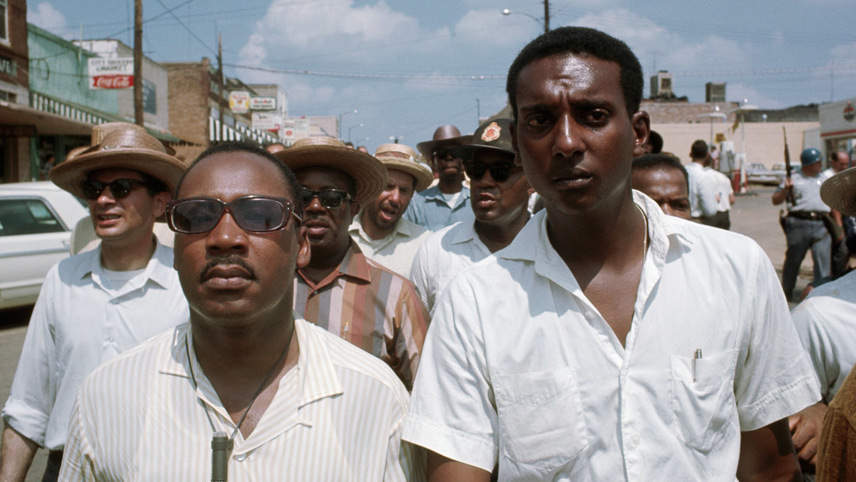
If you haven’t already seen it, “King in the Wilderness” is a documentary you might be interested in.
The film explores the final two years of Dr. Kings life amidst waning influence in the civil rights movement.
His adherence to his principles of non-violence began to morph as he began incorporating aspects of the Black Power movement.
Los Angeles and the west coast were key to Dr. Kings legacy, and in my opinion, his response to the Watts Riots directly impacted a generation of artists emanating from LA.
Prior to his assassination, Dr. Kings final prepared speech, titled “America May Go to Hell,” sought to highlight his foundational message of the Three Evils, or the “Three Midnights” of:
- Racism
- Poverty
- War
While he continued to abhor violence, in his capacity as icon and translator communicated the frustration of ignored communities through the lens of riots, looting and protests.
Moving beyond hope and dreams, he argued, would offer promising paths to those whose plight had been ignored.
Artists such as Noah Purifoy and Betye Saar amplified the message and offer opportunities for deeper levels of reflection, analysis, planning and collaboration through the courage to create.
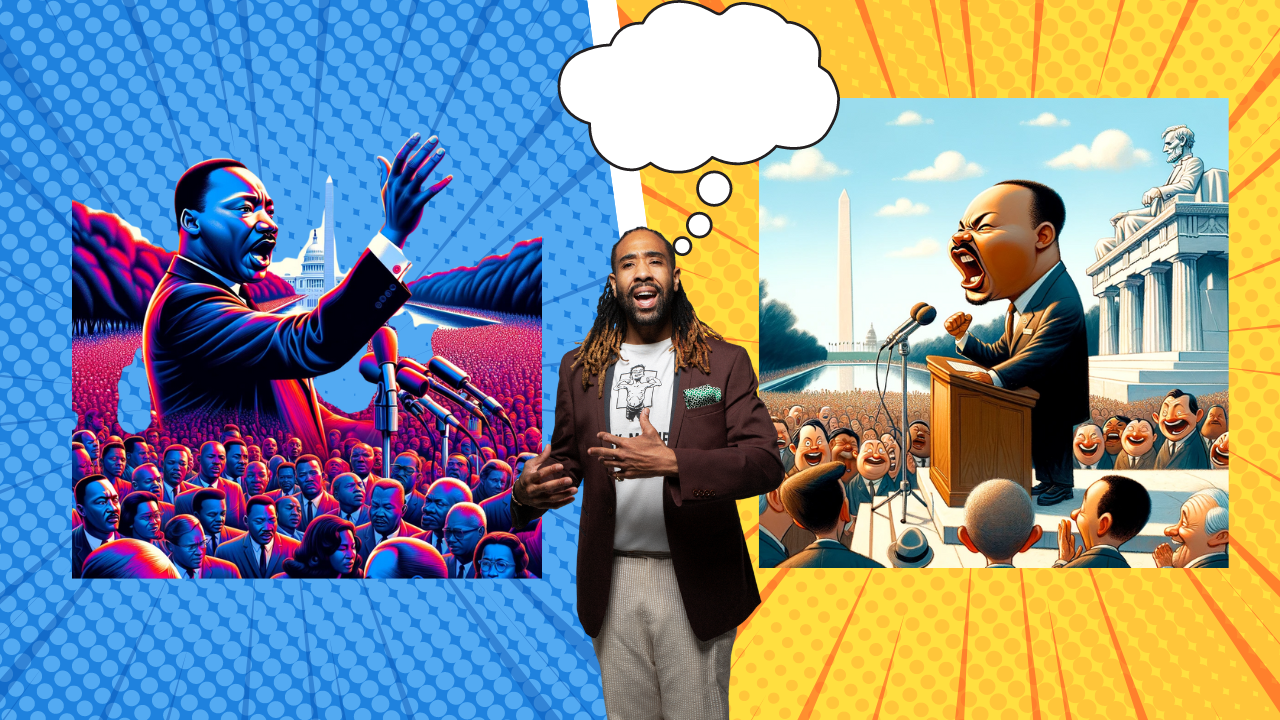
Interpreting the Final Two Years of Dr. King To Celebrate His Legacy Today
Observations on a moment in time then, helps to form normalizations which might challenge the merits of current interpretations of Dr. King's legacy.
This post hopes to offer a point of view regarding how Dr. King's tragic ending, offers the opportunity to separate the man, from the myth and the legend.
King's legacy then, from my view, can only form as deeply as individual willingness to contextualize the context of his life.
Researching and uncovering moments, and not single moments, in time, offer stories.
Multiple stories, told from multiple perspectives, and with time, allows the individual to understand the angles of King's moments, movements and periods.
Those periods then, allow themselves to transfer into information and knowledge, coalesced around various quotes, phrases, concepts or themes.
While listening to music and preparing my mind to write this post, the Conway the Machine assisted Schoolboy Q feature, Fork in the Pot, encouraged me to remember:
Don't settle for punchlines when we've got details.
The trouble with synthesizing Martin Luther King Jr's life into a single moment of time, including the iconic "I Have a Dream" speech, is that it takes an icon, and ensures a pristine process necessary to sanitize the message.
The Art of Curating Dr. King's art, is a valuable art.
Recent personal lessons on art curation, have coupled with challenges I've observed regarding the business of curating collections and exhibits.
Namely I'm interested in understanding:
Who's doing the curating?
Across multiple sources of truth, the maintenance and curation of the "exhibit" representing the totality of Dr. King's Jr's words can be expected to endure the test of time.
Single sources of truth and those willing and able to speak the loudest, won't, although that doesn't change the fact that soundbites can be damaging.
As most artists will tell you though (please do not fool yourself into believing that Dr. King wasn't an artist), is that we don't always have the luxury of determining whether or not a particular work, or message, is being properly portrayed.
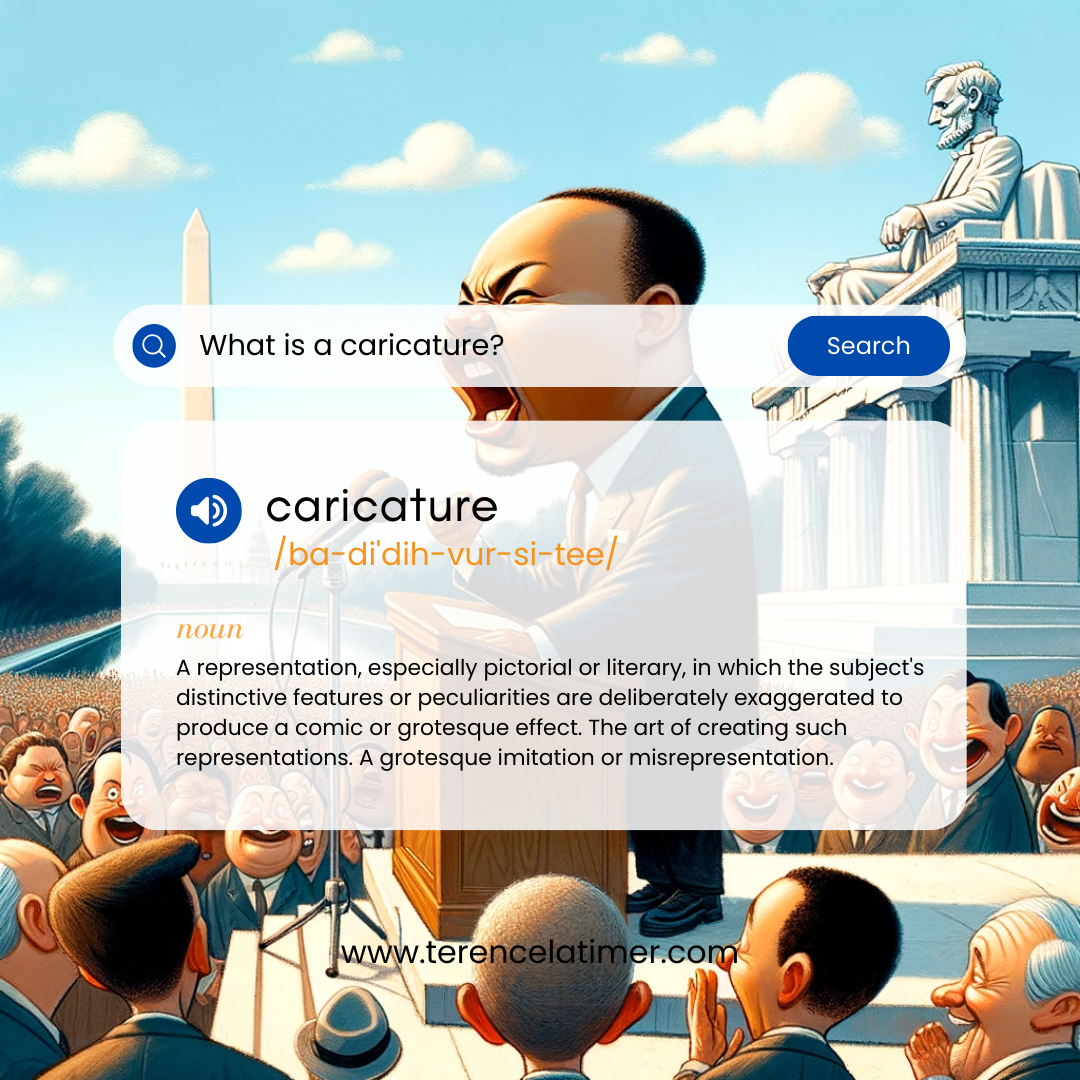
Pieces of art, or in Dr. King's instance, his speeches, perspectives and marches, must be properly represented.
His exhibits, which include the words and interpretations of moments of his time, have me personally deeply appreciative of his writing skills and ability to orate.
I'm sensitive to what I believe was his desire to have a good relationship with his parents, as well as to be a good parent.
I'm mindfully aware of the lessons of dealing with a lost love.
And I'm particularly sensitive to the complexity of a man suffering under the weight of his own influence through imposter syndrome.
Understanding Dr. King Through Those Closest to Him
When considering what it feels like to be wildly successful (in terms of traditional metrics), Dr. King had it all: fame, adoration, and relative economic security.
He also had all the hate and scrutiny to accompany it.
I now believe Dr. King also struggled with his own ability to reconcile with his own influence, which "King in the Wilderness" does a great job of exploring.
I appreciated the approach of the documentary, which interviewed generations of allies and those close to King, focusing on hours worth of interviews against the backdrop of the national narrative and current understanding.
Knowing someone through friends, colleagues, and supporters is powerful.
In my view, like most artists, King faced the questions:
- How will future generations interpret my original message?
- Will my messages stand the test of time?
- Do they deserve to be?
- How will I be remembered?
Through the remainder of this post, my hope for you, the reader, at whatever point and time this message is received by you, you leverage the tools available to you to begin thoughtfully exploring the vulnerable nature of Dr. King on your own terms.
My broad analysis, a character study of sorts, comes from the small amount of information I've received which has been told through the lens of others.
This study has me believing that at his core, Dr. King was a man who had learned to forgive his parents and was committed to protecting and providing for himself and others.
His essence, to me, is the importance of cultivating good ideas and collecting the knowledgable seeds of life allowing for an acceptable way of living, for all.
In my view, Dr. King was a synthesizer of information, and what made his leadership so important was his ability to offer new stories worth telling.
Stories of personal integrity and an encouraged spirit committed to moving beyond hope.
Publicly scrutinizing the War in Vietnam for example.
To move beyond hope, I would argue, comes less in the observation of the words spoken by King, which archivists and historians have rightly studied, but to also intermix a personal exploration by synthesizing collections of stories, both living and legend, and offer new opportunities for interpretation.
To show and not tell.
On the other side of that creative exploration, the "desert of your own mind," offers an oasis of personal predictions based on what you believe Dr. King's leadership would, or would not, look like today and tomorrow.
I'd like to think Dr. King and I would get along.
And if I were lucky enough to know him, my thoughts are I'd try to make him laugh.
From there, I'd discuss what I'd learned from him and most likely would ask specific questions regarding his experience.
If I were lucky enough for him to be engaged with me, and worthy of getting to know me better, I'd probably tell him about some of the challenges I've had marching to the beat of my own drum.
We'd probably discuss some of the challenges regarding drumming for others, all while trying to put together the band.
King, famous for marching to the beat of his own drum, was, in my opinion, plagued by deep levels of insecurity, and depth, through the relationships he had with his parents.
In this instance, the pot calling the kettle black comes in the form of the personal integrity and accountability concerned with the need to define oneself outside of your parents.
Most of us, spend a lot of time blaming our parents, and by extension the world, for our problems.
Accountability comes in the form of recognizing that our parents, regardless of intention, meaning and performance, were probably doing the best that they could.
Unlearning and relearning, which includes transferring the knowledge that allows for personal narratives of safety, comes in the form of communicating and reinforcing the boundaries which allow for healthy relationships and exchanges.
Sometimes we have to learn how to love people from a distance, and in my opinion, Dr King's level of maturity, or the ability to truly walk in the shadow of no man, was tragically cut short.
Unfortunate, obviously, and a theft of opportunity at a larger scale.
Deserted Kings Defined by Desert Conditions
abandon (a person, cause, or organization) in a way considered disloyal or treacherous.
A desert is a barren area of landscape where little precipitation occurs and, consequently, living conditions are hostile for plant and animal life. The lack of vegetation exposes the unprotected surface of the ground to denudation. About one-third of the land surface of the Earth is arid or semi-arid.
Noah Purifoy Moving to the Desert
Considering life in the desert, part of my work here has come in the form of defining, refining and presenting aspects of my identity. The physical, which we more often than not use to offer communities of home, offer limitations the spiritual and mental are typically able to solve for.
Most of us in the desert, in my opinion, are deserters or have been deserted at some point.
Mindful of aspects of the Digital Divide, I recognize Noah Purifoy, and generations of creators like him, sought the to desert and abandon the perils of life in the city.
Abandoning the principles and values which allowed for their objective creation of the subjects and mediums expressing their observations, the desert offered a landscape to claim, or reclaim, community in the form of aggregation.
The current fractals in my opinion, comes in the form of leveraging the language necessary to offer categorization, experience validation and social cooperation.
Dr. King Abandoned by His Supporters
My thoughts are Dr. King's identity as Civil Rights icon has deeply embedded with the personal relationship of a family man seeking to make his parents proud.
The complexity, in my opinion, came in the form of what might have been the first true separation from his parents identity:
his cooperation with the Black Power movement.
Working with Stokley Carmichael, later Kwame Ture, offers a predictive lens to understand Dr. King's process of "becoming his own man."
That process, of identifying new lands and a new home beyond the comforts of everything that you have known, offers all of us the ability to mature and grow outside the immediate influence of family, friends and those personalities sharply responsible for shaping our personalities and opinions.
The Bible, through the story of Moses, offers a parallel for us all to consider regarding the state of Dr. Kings movement at the time leading up to this death.
Moving beyond the earth of home, offered him the opportunity to uncover who was truly, "loyal to the soil."
Who was loyal?
Who was willing to follow him deeper into the desert landscape, to venture beyond the safety of the fertile soils of home, of what had been accomplished, to uncover and navigate unmapped deserts unexplored in the world of the post Civil Rights movement.
Noah Purifoy quoted regarding Dr. King:
Well, it was interrelated with the mind-body thing and art. All that was interrelated with itself, with each other, with my study of existentialism and whatnot.
It brought all of this about. It also brought back my childhood, too, and my basic self. I was basically a good person. And as I told you earlier, I was programmed to do good.
But a good person and doing good are not the same. They're different. Oftentimes I think of Martin Luther King [Jr.] as a person who was programmed to do good. He couldn't do otherwise, because his name was Martin Luther.
Martin Luther was a Christian of the earlier years. "King" is somebody who wears a crown, "Junior" somebody: belonged to somebody else. So he was not himself, he wasn't a person. He was a manifestation of someone else's idea.
Maybe his father or mother imbued him with the need to do good because the black race which he belonged to needed his help. Well, I was pretty much the same kind of person. I chose to express it in art, rather than in religion, as Martin Luther King did.
Wild Conditions Managing Desert Kings
As we consider the wild conditions we all face in todays environment, I believe learned lessons endeavors others to our "Kingliness," or "loyalty."
Serving others at times, includes moving into conditions and amongst peoples suffering under the weight of desert like conditions.
For example, Dr. King traveling to Los Angeles after the Watts riots. Dr. King seeking to understand what had been a living or growing, natural environment, faced circumstances which prevented the community from true cultivation.
The wild spirit of the rebellion, I believe, allowed Noah Purifoy to expands on the concepts. Purifoy, through his collections, periods, materials, mediums, and collections, offer various seeds of wisdom moving Dr. Kings observation for broader view.
Seeds in my view, blown by the wind of the wild abandon of Watts and South Los Angeles after a wild rage.
I surmise this was the period and point of time where Noah began to plot his escape from Los Angeles, though it was perhaps a dream deferred.
A work in process, as an artist, is something one can foundational rely upon. A work, which may take seconds, minutes, hours, day, weeks, months or years to complete, offer new opportunities for new objects to form.
The formation of moments and memories means mean mediums and musings.
The process of creation, in my view, bridges reason and emotion. That bridge, between the abstract and the concrete, offers logical abilities to ensure tactics, techniques and procedures are adhered to and followed.
The Declaration of a Dream Fulfilled
As I've considered the legacy of Dr. King and the possibilities for Black America, I've recently begun to explore Charles Blow.
His recent call for Black America to move to the South, has me intrigued.
A roadmap and green books of sorts, as we wrap up this post and check in on the original question we've posed to guide our conversation, I wonder, what WOULD Martin Luther King Jr. be dreaming about today?
My thoughts are at this stage in his life, he'd be surrounded by great grandchildren.
Wherever he was (I'd like to think he would have settled in Los Angeles,) he would have made his way back home to the South.
If that were the case, it feels like I'm being called to discover and uncover the routes planned and nourished and traveled by Dr. King, and others like him, as he moved along in the South.
Coming full circle as part of this exploration, for me at least, is coming to terms and understanding, what does Black America look like today?
And more importantly, what do we hope to achieve?
Which of our dreams are shared? And which ones are individual?
The fact of the matter?
Blacks come in all shapes and sizes, liberal and conservative, moderate, multilingual, and international.
Dr. King, in my opinion, allows us the opportunity to redefine and refine what it means to collaborate on a shared dream, based on self-identity and mutual trust. Key to this exercise, in my opinion, is on language.
The Gullah people on the South Carolina Islands offer interesting clues I'd eventually like to explore. This includes the 7 states of Alabama, Mississippi, Georgia, Louisiana, South Carolina, Maryland and Delaware.
Celebrating MLK in the Information Age
Mindful of the perils of the Information Age, including elements of cognitive overload and our limited abilities to discern, I’d like for us to avoid the suffering of self-destruction.
Whether we choose to agree to disagree, it is important for decorum and civil discourse as we navigate illusions on who we believe Dr. King was and what he meant.
In 2024, the opportunity presents itself for us to define and redefine power dynamics, understanding, and the authority empowered by Dr. King's message.
One additional kernel from the King in the Wilderness documentary which I found fascinating?
Dr. King wasn’t able to sit with a therapist due to FBI surveillance.
I believe that broadly, psychologists and behavioral therapists would encourage us to bridge the gap of existence, in this instance, celebrating a national holiday online and in person, by forming an understanding of how you feel, and what you communicate, regarding your interpretation of the impact of Dr. King's message.
In my view, uncovering a personal relationship with Dr. King uncovers deeper lessons and reflections on your receipt of his message and messages you receive from your parents.
Whether we’re speaking to them, a friend, or a professional, my hope is you’re encouraged by what Dr. King was able to accomplish with his parents, and for you to consider what he might have been able to do had he had the time to blossom in the ways we know he could have.
If you’re like me, and sometimes struggle under the weight of what your parents do, or don’t want for you, I hope you walk away from today's post with a bit of empathy.
While Dr. King was in the process of seeking alternative means to mature his message, his peers, those before him and after him, offer clues as to who might have influenced his ideology in today's world.
My thoughts are the health of Dr. King’s belief system would be heavily impacted by Medgar Evers and Carmichael.
His organizing allows me to predict a new narrative could have been a new political party.
How great would it have been to have identified a third party capable of working within the system we're currently experiencing?
Mindful that we can only receive the governments we deserve, recent lessons have taught me the importance of our relationships with our leaders while collectively co-creating interdependently within local communities.
Do no harm and leave no trace for me.
My thoughts are like Dr. King, I intend to operate from a place of love.
This generation, in my opinion, can combat the ancient policies and define a new narrative, inclusive of the physical, spiritual, mental, and digital.
This next iteration of technology, from the Information Age to the Data Age, or perhaps even the age of AI, means we must empower humanity at large, to remember who we are.
Understanding where we are, and where we’re going, are all within that scope of work, and allows us to move past a place of fear beyond home, communicating the divine spirit communicating Dr. King's Kingdom.
My concern with Large Language Models, and allowing our inability to collectively define who Dr. King was, impacts the polarities of populism and evasively creates confusion.
I’ve noticed hate groups channeling the message of Dr. King, causing harm.
We can’t let that happen.
The reverberation of Dr. King's words has moved the history of America through complicated feelings and evolutionary behavior:
Let's choose to embrace a new Dr. King movement and awaken a spirit of aspiration.